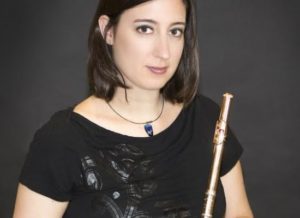One winter evening in Cincinnati, I went into the Blue Wisp Jazz Club, and I saw the musicians of Classical Revolution Cincinnati performing there. And they were taking their music straight to their audience. … They booked their own clubs, they found their colleagues, [they] chose what they were going to play. And I saw creativity, joy, life, music and this beautiful connection between audience and performers. And it was like I had spent 10 years banging my head against a door that would never open [honing her flute technique, auditioning for orchestra jobs], only to look around and realize that there were no walls. I could just walk outside and create the career that I wanted.
 That’s from Sarah Robinson’s talk at the pathbreaking — and inspiring — 21CMposium held in September at the DePauw School of Music. The symposium’s subject: 21st century classical musicians and the future of conservatory education.
That’s from Sarah Robinson’s talk at the pathbreaking — and inspiring — 21CMposium held in September at the DePauw School of Music. The symposium’s subject: 21st century classical musicians and the future of conservatory education.
You can watch Sarah’s talk here, and I so happily hope that you do. On her website she calls herself a flutist, concert producer, author, and educator, and she also co-heads the Los Angeles branch of Classical Revolution, the organization of classical musicians who play in clubs.
What made her great
In her talk she detailed joyful achievements, in so modest and personal a way that she became everyone’s role model. A classical musician who found her own path, and the perfect example of what conservatories should celebrate, teach, and with all their strength encourage.
You can also watch David Wallace, chair of the string department at Berklee, talk about a new way to teach — in which students and teachers become a community.
Another post I did on the symposium was about its most apparently orthodox moment, when four past and present conservatory heads spoke on a panel.
But what they said was subversive: that conservatories shouldn’t just teach classical music, and that instead of defining what students should learn (technique, the repertoire for those instrument or voice type, orchestral excerpts), they should help students be creative,and find their own way.
I gave the keynote, and I’ll link it here when DePauw posts it. But I got far more caught up in what other people said.
